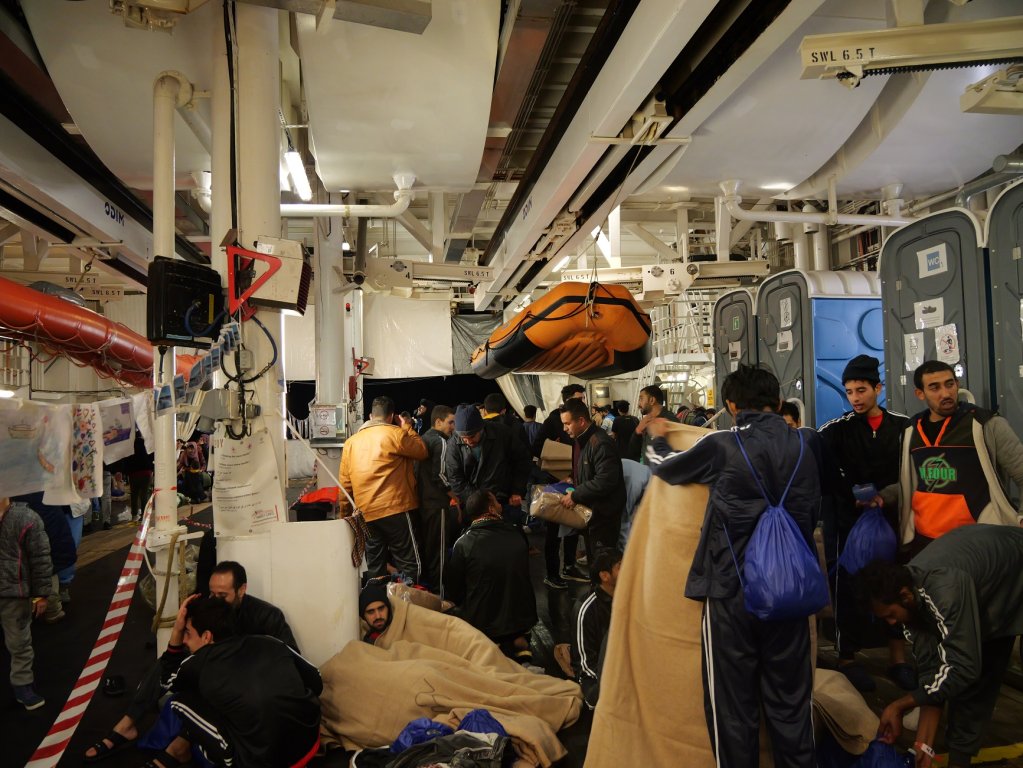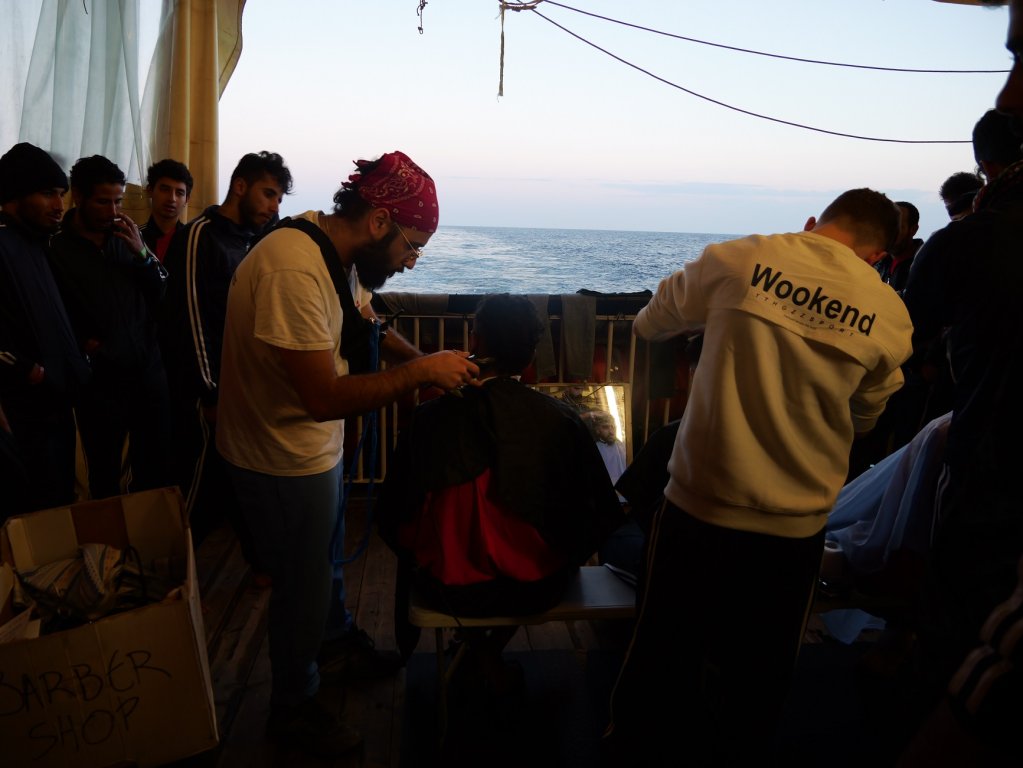Migrants risking their lives crossing the Central Mediterranean share their stories of financial exploitation in Libya. They recount repeated interceptions at sea by the EU-backed Libyan coastguard and detention in North Africa until they are able to pay for their release, only to be intercepted again. Do Europe's anti-migration measures perpetuate extortion, corruption, and clandestine financial flows on the Mediterranean route? InfoMigrants investigates the hidden costs behind European migration.
Amina Muhammad, a Kurdish woman from Kobani, had hoped to join her husband in Germany, but their reunification application was rejected. So she opted for the irregular way via Libya and the Mediterranean crossing with some relatives. A smuggler kept them in a crowded house in Tripoli with other Europe-bound migrants for six months, providing little food until an opportunity arose for a sea crossing.
Until a sea departure can be organized, migrants may be kept in so-called connection houses or connection farms. Here, women in particular are at risk of becoming victims of sexual violence, warned Flavio Di Giacomo, the International Organization for Migration (IOM) spokesperson for its Coordination Office for the Mediterranean.
In one incident, the boat Amina was in took on water and they were forced to return to the smuggler's connection house. Three days later, they were promised a journey to the Italian island of Lampedusa, but instead Amina said they were taken to the northwestern city of Zawiya and sold to other smugglers. The new smugglers detained the men, stripped them and took all their money and belongings. Some of the men who had wives and children were let go.
"They did that so that they could demand them 1,500 dollars each for their release," Amina told InfoMigrants. "There were four of our young relatives, all of them minors. They imprisoned them and released them after 10 days in exchange for 1,500 dollars per person."
During her third attempt to cross the Mediterranean, Amina was at sea for 12 hours before being intercepted by the Libyan coast guard and sent to a prison with other female migrants. This time, all the women were stripped and all their money and possessions were stolen by the prison authorities, she said. Two weeks later, she was released only to be intercepted again by the Libyan coast guard after just 30 minutes at sea. This time, she was sent to the notorious Abu Salim for 13 days, after which she had to find new smugglers to facilitate her final crossing to Europe. Abu Salim is an administrative detention center managed by Tripoli's Ministry of the Interior and the Department for Combating Illegal Immigration (DCIM).

'Smuggling doesn't happen without corruption'
Migrant smuggling across the Mediterranean has become an illicit economy orchestrated by organized criminal groups in Libya and facilitated by various corrupt actors including government agencies, police officers, military personnel, and militia. Both the country's eastern and western leadership exploit the vulnerabilities of migrants fleeing warfare and hardship for personal financial gains. Europe-bound irregular migrants usually cannot navigate Libya without the use of smugglers.
"Smuggling doesn't happen without corruption — we see corruption at every level," said Claire Healy, a research officer at the United Nations Office on Drugs and Crime (UNODC) and coordinator of its Observatory on Smuggling of Migrants. "The demand for using a smuggler is always there because people see they can't make the trip without paying bribes," she told InfoMigrants. One of the services smugglers provide is paying bribes on behalf of the migrants so they can negotiate a slightly lower bribe, or to make sure that a person is actually being released from detention, according to Healy.
Armed smugglers at departure points in Libya such as Sabratha facilitate irregular sea crossings across the Mediterranean in small, rickety vessels — despite having promised much larger ships. Several migrants on board the Geo Barents told InfoMigrants that they were met with a gun to their faces, after telling smugglers they were too scared to board the unseaworthy boat and wished instead to return to their home country, telling the smugglers they could keep the money.
"Even if migrants change their mind before leaving, they cannot. Once you pay, you cannot go back. This is the rule," Di Giacomo from IOM stressed. "They [smugglers] are not interested in the migrants arriving in Europe. They don't really care. They put them on the boat, they leave, they get the money. That's it. If you give problems, they kill you on the beach — and women are mainly victims of sexual violence," he warned.

The outsourcing of migrant interceptions at sea
Migrants may find themselves crossing the Mediterranean numerous times, as they are repeatedly intercepted by the EU-backed Libyan coast guard and detained until they can pay their way out again — fueling a lucrative and cyclic industry in which various actors, including state agencies, profit from border control mechanisms.
In interviews, migrants told InfoMigrants that the partially EU-financed Libyan Coast Guard would take bribe payments from migrants and smugglers in exchange for not intercepting them in the Mediterranean.
When asked whether the IOM has officially recorded any such instances, Giaccomi responded: "Frankly, no. Many things can happen in Libya so…money can pay probably a lot of things, but I don't know if these kind of things happen."
Frontex, the European Union's border surveillance agency, declined InfoMigrant's request for an interview.

'Without demand, there is no supply'
Healy from UNODC warns against falling into the political narrative that migration must be curbed because it fuels the people smuggling industry.
"Based on our research, there's very rarely a situation where the smuggler convinces somebody to be smuggled to take the journey. In Syria, throughout Africa and South Asia, people have extremely strong motivations to leave and they are actively looking for a smuggler," said Healy. "So it's not that the smuggler goes around targeting people and convincing them to go." Migrants seek out smugglers based on their migration objectives, whether they are displaced persons or war refugees, according to Healy.
"The thing about the smuggling market in Libya is that it's different to other countries — you just cannot operate smuggling there without engaging with local smugglers or armed groups," she explained.
To counter the people smuggling industry, the endemic system of corruption which permeates Libya and the Mediterranean route needs to be addressed first.

"Again, smuggling doesn't happen without corruption — that's just not mentioned enough. Sometimes we're targeting the wrong people in a way. If we really want to stop smuggling, corruption is one." The second one, according to Healy, is market-driven — there's a very strong demand for smuggling.
"Even if you sort of try to dismantle one network, the demand for smuggling still exists and that is related to that is the fact that for some people like Syrians, Sudanese, etc., there is no option for them to travel regularly," she said, stressing that safer, faster and regular routes must be established.
Click here for Part 3
*This series is based on an investigation conducted between February and May 2024 across Germany, Italy, and the Central Mediterranean. The investigation included a period on board the Médecins Sans Frontières (MSF) search and rescue ship, the Geo Barents, from January 30 to February 10. InfoMigrants was unable to independently verify the personal testimonies provided by migrant individuals.
